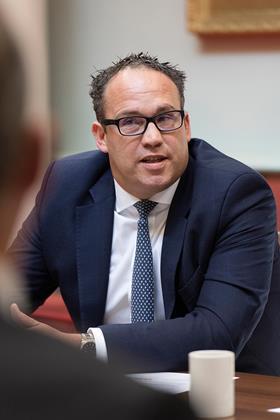As Lloyd’s of London reviews its operations, the indemnity insurance market appears to be hardening for the first time in years. But well-managed firms that act swiftly should encounter few problems, hears Paul Rogerson
THE LOW DOWN
For the first time in years the professional indemnity insurance market appears to be hardening, though brokers stress that there remains plenty of choice for well-managed firms. Last month the market was hit by the withdrawal of elite provider Libra Managers, as troubled Lloyd’s of London (pictured) reviews its appetite for risk following hefty losses. Ten top-200 firms were left with just six weeks to find new cover. Reduced excess layer capacity is also an issue and those insurers that remain have adopted a more cautious approach to pricing. So, what to do? Above all, law firms should not leave it late as the most common renewal date of 1 October looms. Last-minute shoppers are in danger of finding the shelves disconcertingly bare.
The Gazette’s regular snapshots of the professional indemnity insurance market are no longer in danger of becoming repetitive. Until very recently – and for the fourth year in a row – premiums were being described almost universally as ‘stable’ and the overall market as ‘benign’.
In recent weeks, however, warnings of potentially tighter times ahead have crystallised in a tangibly ominous development. Providers connected with troubled Lloyd’s of London have bailed out of the PII market altogether, with as yet uncertain consequences.
As lawgazette.co.uk revealed last month, Libra Managers, which provides cover to 20 of the top-200 law firms, confirmed it would not underwrite any new business from 1 October. That left 10 of the 20 firms, for which 1 October is the renewal date, with just six weeks to find a new insurer.
City of London-based Libra’s decision followed reports that Lloyd’s has initiated a strategic review of the whole business in response to a £2bn loss last year. Lloyd’s chairman Bruce Carnegie-Brown told Reuters that Lloyd’s is looking at all aspects of its business – including how it mutualises risk.
Explaining its decision to exit PII, Libra told the Gazette: ‘After careful consideration Libra has concluded that current market conditions are not compatible with sustainable and responsible underwriting.’
John Wooldridge, of solicitors’ PII broker Howden, said Libra’s departure could have potentially ‘frightening consequences’ for all law firms seeking insurance in the runup to 1 October, which remains the most common renewal date for the sector.
Some upward pressure on prices appears certain – especially as Libra is not the only provider linked to Lloyd’s to have pulled out. On 1 August Aspen Insurance UK revealed that after reviewing business written on the Lloyd’s platform, international professional indemnity had ‘disappointed’ and therefore Aspen would cease to underwrite this book.
‘For the first time in many years the solicitors professional indemnity market is hardening, and more firms may find it difficult to obtain competitive terms,’ says Patrick Bullen-Smith of broker Hera Indemnity.

‘Participating insurers, including Lloyd’s syndicates, are having to realign their pricing and are looking to “hold rate” as a minimum. This means that an increase in fee income is translated directly to increased premiums, regardless of claims experience.’
Bullen-Smith adds: ‘This hardening market is aggravated by reduced excess layer capacity, and as a result a number of insurers have recently exited the PII market. Those insurers that remain have adopted a more cautious approach to pricing.’
Brian Boehmer, partner at broker Lockton, describes the 2018 renewals season as ‘a little bit slower’ than in previous years, with developments at Lloyd’s indicative of emergent market volatility.
‘The recent results of PI providers within Lloyd’s of London have resulted in a call to action,’ says Boehmer. ‘Lloyd’s is currently challenging its syndicates’ forthcoming plans to ensure that there is a route back to profitability and failure to do so may result in them not being allowed to write business.
‘Whether this was the catalyst or merely coincidence, Aspen and now Libra have advised that they will no longer be writing this class.’
He adds: ‘Lack of capacity above the compulsory layer, stemming from insurer exits as a result of losses has meant that those firms that buy additional coverage are paying more; particularly for their first excess layer up to £10m. Insurers that participate in this space are making some price adjustments due to applying rate increases.’
Yet it is far from all ‘doom and gloom’, as Boehmer stresses. ‘There is still lots of choice available from the right broker and there are steps firms can take,’ he says. ‘This season, [Lockton has] seen that those firms that spend a little more time in their presentation to provide a greater insight into their practices and help them stand out from the crowd are generally reaping the reward.
‘There should be plenty of choice, but it is important not to be complacent, the insurance cycle can turn quickly. Select the broker who is representing you carefully; direct access could prove to be important if you would like a swift resolution.’
Indeed, brokers are unanimous in stressing that time is of the essence, urging law firms not to procrastinate.
‘For firms that haven’t already begun preparing their presentation, I recommend that they do so, without any further delay,’ Boehmer advises. ‘If the market does turn, any of the last-minute shoppers may find themselves in a very different place this year from what they have experienced in the past. Forewarned is forearmed.’

Bullen-Smith concurs: ‘This is not the year to “leave it late”,’ he stresses. ‘Firms should look to review and conclude their PII arrangements as soon as possible to avoid being caught by rates that are likely to harden further as the 1 October renewal season draws to a close.
‘Solicitor firms with a historically good claims record will always be in a strong position to negotiate their premiums, but to do so they need access to all the relevant insurers and to approach them early.’
Paul Bennett, partner, professional practices & employment at solicitors firm Aaron & Partners, also offers reassurance. He believes the market remains favourable overall – particularly for non-property firms.
Providers are not being slow to innovate, certainly. Last month, for example, Marsh launched a PII product for small and mid-sized law firm clients which it claimed is the first of its kind to use analytics and independent performance data to model a law firm’s individual risk profile. ‘As a result, law firms will receive tailored pricing based on their risk management performance and claims histories,’ it added.
Broker Paragon, meanwhile, has announced an exclusive arrangement with AIG for two- and three-partner practices.
The onus on providers to innovate as the market tightens is sure to intensify, especially as law firm clients pose different questions about the risks to which they are exposed.
‘I am suddenly being asked about my view on the add-on policies such as crime, cyber fraud, and directors and officers (D&O) insurance covering SRA investigations and cases,’ Bennett tells the Gazette.
‘It is essential that firms confirm what the policy covers. If it is General Data Protection Regulation (GDPR), data loss and IT systems loss, then a cyber policy possibly will exclude theft and fraud on the client account. If firms want to insure for this they need to take a crime policy.
‘D&O-wise, the choice of solicitor should be checked. Defending solicitors is a specialist skill-set and only a few of us really do it day-in, day-out. When your career is on the line expertise is essential.’
There are more questions than answers, at present, as solicitors await the outcome of the SRA’s reheated and highly controversial proposals to reform PII. These would cut the minimum single claim limit it requires firms to insure for to £500,000 – and £1m for conveyancing work.
A final report is likely to go before the SRA board in October, with a final decision expected around the turn of the year.
Whether these reforms will cut premiums remains a moot point, to say the very least. The Association of British Insurers is among many to have warned that this is far from guaranteed.
Planning for the post-SIF landscape
In just two years’ time the Solicitors Indemnity Fund (SIF) will close to new claims. When it does, firms that have closed without successor practices will have to arrange their own insurance cover to provide ongoing protection once the mandatory six-year run-off period has ended. However, research carried out on behalf of the Law Society reveals that only 47% of members are aware of SIF’s impending demise, and those who are most affected are least likely to be aware.

I recently received a call on behalf of a solicitor who had died in 2012 and whose professional indemnity insurance run-off cover had ended with the liquidation of insurers Alpha. His widow could not afford the quoted premium of £5,000 for the remaining 18 months of her late husband’s run-off cover.
Solicitors Regulation Authority data tells us that 85% of firms have four partners or fewer (a quarter are sole practices), and 26,000 solicitors work in such firms. Last year more than 600 firms ceased to practise, mainly in this sector, and while the reasons for small firms closing are many and varied, retirement and economic considerations predominate.
As chair of the Law Society’s Professional Indemnity Committee, my post bag was full of correspondence from solicitors who were unable to shut up shop and retire, for the simple reason that the cost of closure was too great, and in particular the cost of paying up front for six years’ worth of run-off cover – which is usually a multiple of three times the final year’s PII premium – was a prohibitive burden.
There is increasing anecdotal evidence that the soft market of the last 10 years may be hardening. That long-expected turn in the economic cycle will, if it happens, put additional pressure on small firms for which quoted premiums are already in the range of 4.9-6.3% of annual turnover (as opposed to 3.0-3.5% of turnover for 5-25 partner firms, and around 1% for the top 100).
The SRA has not helped small firms with its recent announcement of a hike in contributions to the Compensation Fund, which have more than doubled since last year. Here, the inequality between small and larger firms is striking. The smallest sole practice with a turnover of, say, £20,000 must pay the same contribution (£1,680) as a top-100 firm. With little or no warning and little or no explanation beyond a statement from the SRA blaming solicitors’ involvement in investment scams, the individual contribution has gone from £40 to £90. The firm contribution similarly rose from £778 last year to £1,680. There will be little comfort from the SRA’s figures that ‘the imminent risk of very high payments remains relatively low’. The PII Committee will be taking up this issue in an attempt to pre-empt such precipitous rises in the future.
Many of us will shortly receive an email from our broker with an indicative quote for this year’s renewal and thoughts of closure and retirement for some of us will come to mind. So it is worth bearing in mind that this year, for the first time, there is a competitive market in run-off insurance. The Law Society has procured the services of a leading professional indemnity broker who has found triple A-rated underwriters prepared to give a free-standing competitive quote for run-off cover.
As previously implied, there is a regulatory requirement for any solicitor closing their practice to purchase six years’ worth of run-off. It is also a requirement of the SRA’s Participating Insurers Agreement that the insurer in the last year of practice must provide such run-off cover. However, it is not compulsory for the solicitor to take the cover from that provider. There is now an opportunity to drive down the costs of PII cover for run-off by establishing a competitive market. For too long, there has only been one option for the placing of cover and the insurers have had the whip hand in dictating terms.
SIF closes on 1 October 2020. Never again will we hear the phrase ‘cradle to grave’ cover. Presently, after the expiry of the six-year run-off provided by an open market insurer, SIF – which was the Law Society’s mutual fund until 2000 – would pick up any ‘waif-and-stray’ claims that arose more than six years after closure, because the Law Society always considered the reputation of the profession was best served by providing the highest standards of client financial protection.
However, the funds contributed prior to 1999 are rapidly dwindling. From 1 October 2020, claims against solicitors arising more than six years after a firm’s cessation and where there is no successor practice will be uninsured. If you have retired, or intend to retire, or if you belonged to a firm that has closed or merged without a successor practice, then you may well find yourself personally exposed to liability for post-six-year run-off claims and should prepare accordingly.
To afford protection to those solicitors who want it, the Law Society has worked with a broker to ensure the availability of an insurance product which will extend the length of run-off cover, either on an annual rolling renewal basis or by providing run-off cover for a longer period than the mandatory six years. So, for example, if you are minded to close your practice on 1 October 2018 you could elect to buy nine, 12 or 15 years’ worth of run-off cover on the open market.
Similarly, if you had been a member of a practice which merged, say, in 2013 and triggered run-off for one party to the merger, it will be possible to buy annual extensions of PII cover for that firm beyond SIF’s designated closure.
At this point none of us knows what the PII renewal season will throw up. We do not know if it will be the last one where the existing minimum terms and conditions will apply or if the market will harden, but we do know that there are options available to plan for the post-SIF landscape.
If you want to know more about the availability of these products, (and post-six-year run-off in particular), then please contact Simon Thomson, the Law Society’s policy adviser for professional indemnity insurance at simon.thomson@lawsociety.org.uk.
Alan Radford was until 1 September chair of the Law Society’s Professional Indemnity Insurance Committee
































1 Reader's comment